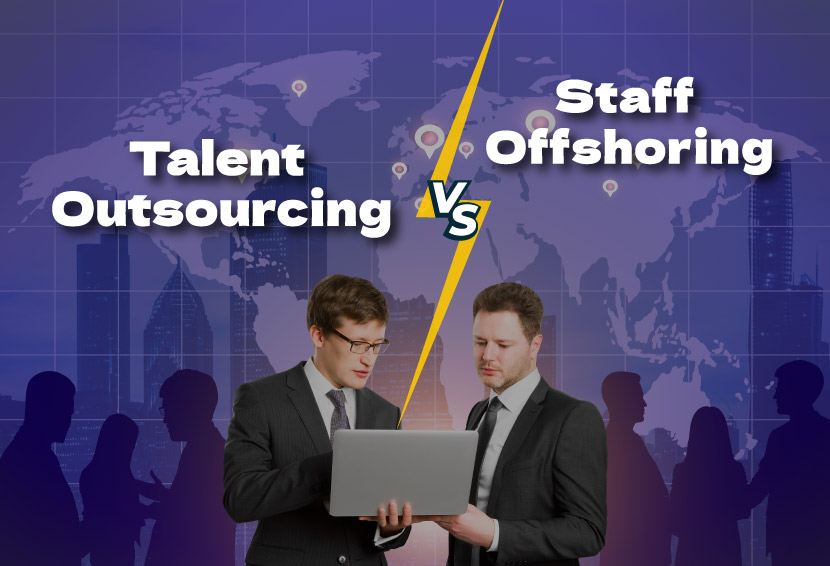Companies are constantly seeking ways to optimize their operations, reduce costs, and access specialized skills. This is where outsourcing and offshoring come in. Both strategies can help you access a wider talent pool and potentially save money, but there are key differences to consider. So, what’s the real difference, and which option is right for your business? Let’s start on a journey to clarify “outsourcing vs offshoring” strategies and help you make an informed decision for your business.
Outsourcing vs offshoring: Definitions
To understand the differences between them, we must first discuss what they are.
Outsourcing meaning
Imagine having access to a team of experts who can handle specific tasks for you, freeing up your internal team to focus on core business activities. That’s the magic of outsourcing! Outsourcing is the practice of contracting external companies or individuals to complete specific tasks or functions for your business. This can involve a wide range of activities, including:
- Website development and maintenance
- Marketing and social media management
- Customer service
- Accounting
- IT support
And much more.
Offshoring meaning
Offshoring is a specific type of outsourcing where the work is relocated to a foreign country, typically with lower labor costs. While offshoring offers significant cost savings, it can also involve managing a remote team in a different time zone and navigating potential cultural differences. Offshoring aims to take advantage of cost efficiencies while accessing a broader talent pool.
Now, let’s explore the “outsourcing vs offshoring” key differences.
Outsourcing vs offshoring: What are the key differences?
Before making the decision to deal with outsourcing and offshoring companies, the table below summarizes the key differences between staff offshoring and talent outsourcing.
| Feature | Outsourcing | Offshoring |
| Definition | assigning a third party to handle non-core business activities. | Relocating your business’s operations, procedures, or services to another country. |
| Location of Provider | Domestic or International | International (typically lower labor cost countries) |
| Objectives | Focus in core buisness | Lower labor costs |
| Cost | Potential cost savings on labor and expenses | Generally lower labor costs compared to domestic outsourcing |
| Scalability | Easily scalable up or down | Scaling may be more complex due to geographical distance |
Outsourcing vs Offshoring: Advantages and Disadvantages
Both outsourcing and offshoring offer several advantages:
Outsourcing benefits
When working with outsourcing companies, you will benefit from the following:
- Access to Expertise: Access to a wider talent pool with specific skills and expertise.
- Cost Savings: Potential cost savings on labor and expenses, even when using domestic providers.
- Focus on Core Activities: Increased focus on core business activities by delegating non-core tasks.
- Efficiency and Scalability: Improved efficiency and the ability to scale operations quickly.
Outsourcing risk
- Potential loss of control over quality and project management.
- communication challenges.
- Dependence on a third-party provider.
- Security Risks.
Advantages of offshoring
The benefits of working with offshoring companies are listed below.
- Significant cost savings on labor costs.
- Access to a wider talent pool in specific geographical regions.
- 24/7 Operations, you can offer extended customer support or ensure continuous production.
- Easily scale your workforce up or down depending on your business needs.
Offshoring risks
The risks of offshoring are listed below:
- Security Risks.
- Cultural Differences.
- Loss of control.
- Potential legal and regulatory challenges in foreign countries.
- Increased complexity in managing remote teams.
Outsourcing vs offshoring: Reasons Why Companies Outsource
Outsourcing is ideal if you want to focus on your strengths while hiring experts. Companies may outsource for these reasons:
- Access to specialized skills that are not available in-house.
- Flexibility to scale operations up or down based on demand.
- Ability to focus on strategic activities by outsourcing routine tasks.
Outsourcing vs offshoring: Reasons Why Companies Offshore
Offshoring is a good option if you want to grow in a specific area but lack certain skills. Companies may offshore staff for the following reasons:
- Significant reduction in operational costs.
- Access to a global talent pool with diverse skills.
- Strategic presence in multiple regions for global market reach.
Outsourcing vs offshoring: Making the Right Choice for Your Business
While both have advantages and disadvantages, it is difficult to make the right decision for your business and choose between outsourcing and offshore companies UAE. However, the best approach depends on your specific needs. Ask yourself:
- What tasks do I want to outsource or offshore?
- What is my budget for this project?
- What skillset do I need to complete the project successfully?
- How important is direct control over the work?
By carefully considering these factors, you can choose the strategy that best supports your business’s growth, and we at intellitalenthub are ready to help.
Ready to explore outsourcing and offshoring companies?
Are you ready to explore the benefits of outsourcing or offshoring for your business? Look no further than IntelliTalentHub, one of the leading outsourcing and offshoring companies in the UAE. At IntelliTalentHub, we specialize in both outsourcing and offshoring services, helping businesses optimize their operations, reduce costs, and access top-tier talent globally.
Our extensive experience and strategic partnerships with numerous business companies ensure we deliver exceptional value and results. Whether you need accounting, banking, IT services, digital marketing, or web development, IntelliTalentHub has the expertise and resources to meet your needs and drive your business forward. Partner with us today to unlock your business’s full potential.
Conclusion
Outsourcing and offshoring can be powerful tools for businesses of all sizes. By understanding the “outsourcing vs offshoring” key differences and carefully considering the pros and cons, you can make an informed decision and unlock the potential of a global talent pool to take your business to the next level. So, are you ready to explore the possibilities? Contact us now!
FAQS
What are the 4 types of outsourcing?
The four main types of outsourcing are professional outsourcing, IT outsourcing, manufacturing outsourcing, and process-specific outsourcing. Each type allows businesses to delegate specialized tasks to external providers, enhancing efficiency and focusing on core competencies.
What is offshoring in banking and offshoring accounting?
Offshoring in banking involves relocating banking operations and services to foreign countries, while offshoring in accounting involves relocating accounting and financial services to a foreign country, both of which benefit from lower labor costs and access to skilled professionals.




